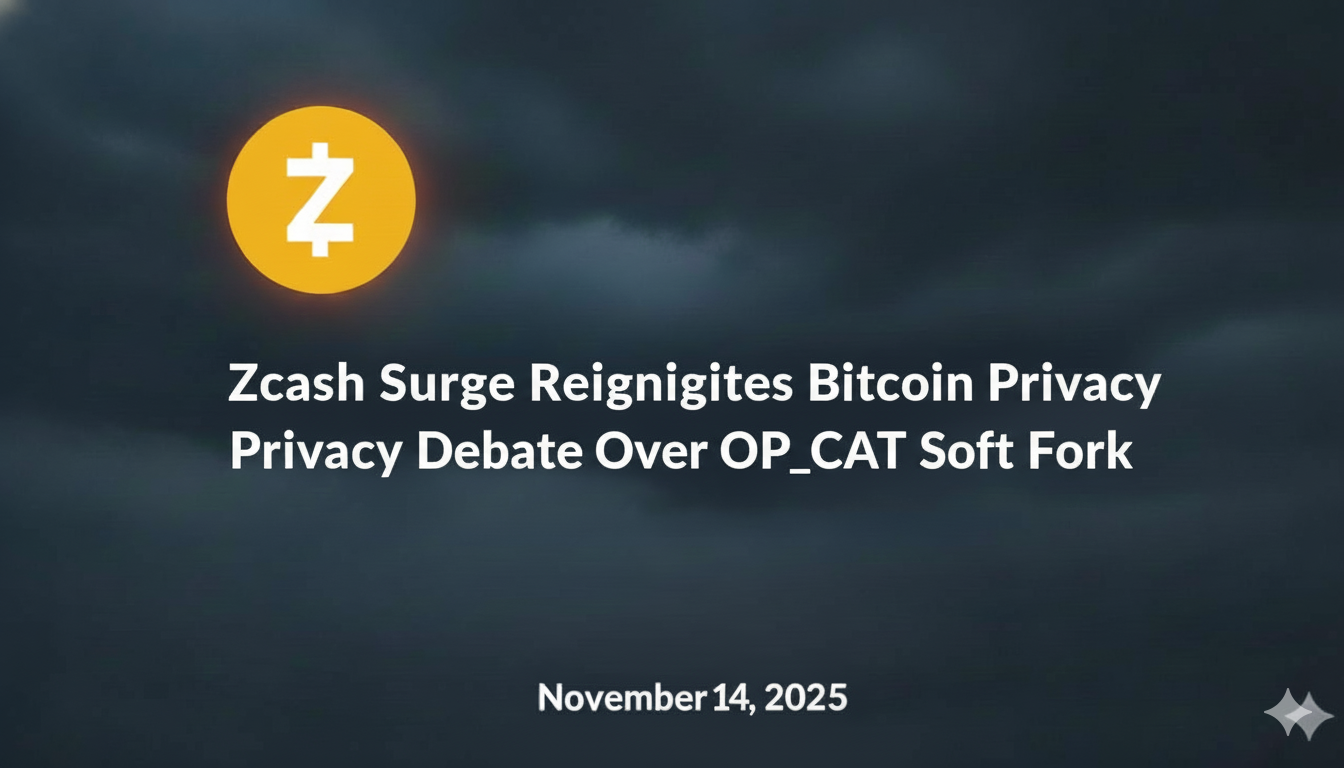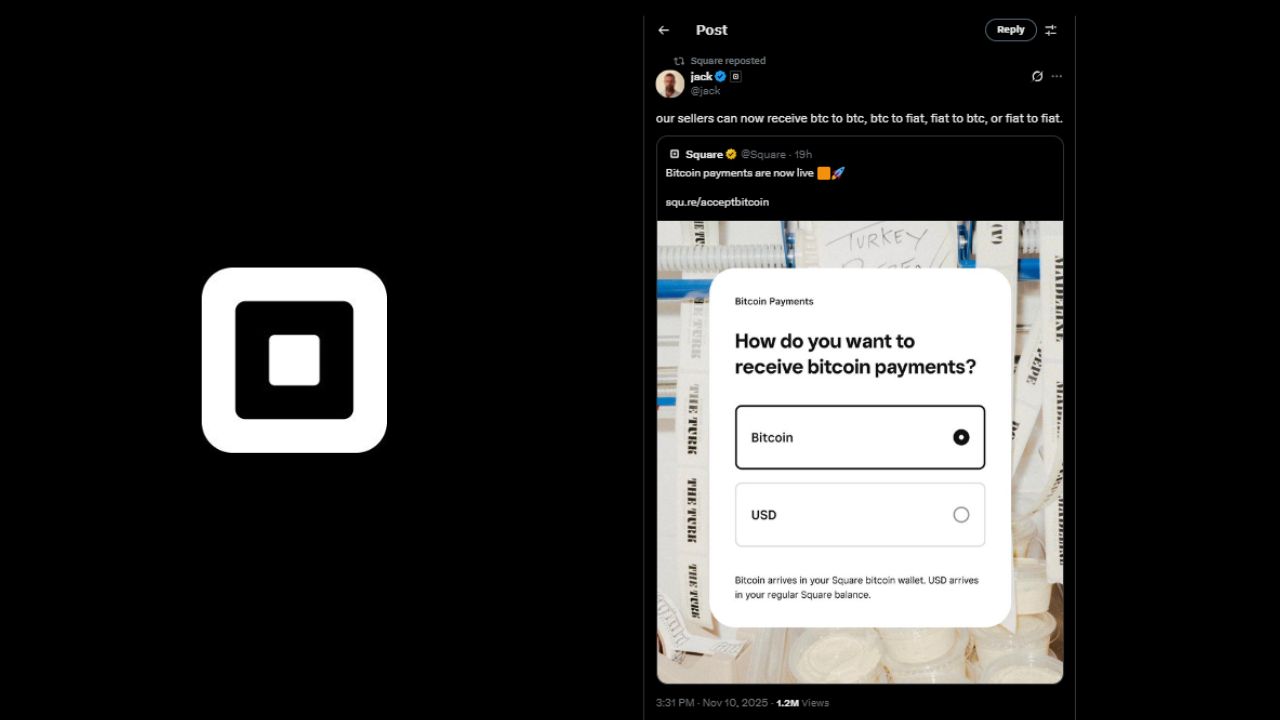StarkWare founder Eli Ben-Sasson thinks Zcash’s recent surge might finally get Bitcoin developers to care about privacy. After years of watching the community ignore the issue, he’s pointing to ZEC’s 30% jump and renewed institutional interest as proof that demand for private transactions isn’t going away.
Bitcoin’s transparency is both its strength and weakness. Every transaction lives permanently on a public ledger where anyone can trace amounts, addresses, and patterns. For an asset positioning itself as digital gold and a medium of exchange, that’s a problem. Zcash solved this with zero-knowledge proofs that let users shield transactions. Bitcoin could theoretically do the same thing by reactivating OP_CAT, an opcode Satoshi Nakamoto disabled in 2010.
Ben-Sasson has been in this fight since 2013 when he first presented zero-knowledge proof technology at a Bitcoin conference. Back then, prominent developers like Greg Maxwell and Mike Hearn immediately understood the implications. They wanted the code. They wanted it implemented. But Bitcoin’s conservative development culture meant protocol changes moved slowly, if at all. So the team that developed the technology went off and built Zcash instead.
See also: Arthur Hayes Zcash Investment: Privacy Coin Becomes Second-Largest Holding
Now ZEC is trading at $541 with an $8.79 billion market cap, up from relative obscurity just weeks ago. The Winklevoss twins launched an entire treasury company around it. Naval Ravikant is talking about it. Balaji Srinivasan is backing it. When crypto’s most influential voices start coordinating around a privacy narrative, something is shifting in the market.
Even Ben-Sasson sees an opening.
“I hope that one consequence of this would be that the Bitcoin community becomes more open to things like OP_CAT and OP_STARK so that it can have post-quantum security, privacy, scale and programmability,” he told Cointelegraph.
The technical barrier is minimal. A soft fork adding nine lines of code. But getting Bitcoin developers to agree on anything controversial has proven nearly impossible.
The original Zerocash white paper from 2014 was subtitled “Decentralized Anonymous Payments from Bitcoin” for a reason. The team built it as a Bitcoin solution before realizing Bitcoin wasn’t going to adopt it.
That history matters because it shows privacy features were never some fringe concern. Early Bitcoin developers recognized the transparency problem immediately. They just couldn’t agree on how to fix it without introducing new risks.
OP_CAT enables string concatenation in Bitcoin scripts, which sounds boring until you realize it unlocks significantly more complex logic. With OP_CAT active, developers could implement zero-knowledge proofs, covenants, and various scaling solutions directly on Bitcoin. Satoshi included it in the original code but disabled it over concerns about denial-of-service attacks through memory exhaustion.
Modern proposals address those security concerns with size limits and resource constraints. The technology exists. The code is ready. What’s missing is political will within Bitcoin’s development community. And that’s where things get messy.
Bitcoin operates through rough consensus among developers, node operators, miners, and major economic actors. Protocol changes require broad support across all these groups.
The SegWit activation fight in 2017 nearly split the network over a capacity increase. Taproot took years of careful political groundwork before activation in 2021. Both of those upgrades had overwhelming technical support and clear benefits.
Privacy features don’t have that consensus. Some developers argue transparency is a feature, not a bug. Public transaction history prevents hidden inflation and enables auditing.
Adding privacy layers could compromise these guarantees, or at least make them harder to verify. Others counter that optional privacy, like Zcash’s hybrid model, preserves transparency for those who want it while protecting those who need privacy.
The regulatory dimension makes everything more complicated. Privacy features invite scrutiny from regulators already concerned about crypto’s use in illicit finance. Zcash exists as a separate blockchain that can absorb regulatory pressure without affecting Bitcoin. Adding native privacy to Bitcoin would make the entire network a target for enforcement actions.
Ben-Sasson’s argument is that zero-knowledge proofs actually solve this problem elegantly. “We knew zero-knowledge proofs solve two problems: scalability and privacy. They offer integrity,” he explained. “They basically can convince you that the right thing has been done, even when you’re not watching and even when you don’t actually see all the details.”
That integrity property means you can prove transactions are valid without revealing amounts or participants. In theory, this satisfies both privacy advocates and regulators concerned about hidden money printing. In practice, regulators haven’t shown much interest in the technical nuances. They see privacy features and think money laundering, regardless of how the cryptography actually works.
The Winklevoss twins are betting Zcash fills the gap Bitcoin left open. They launched Cypherpunk Technologies in November after acquiring Nasdaq-listed Leap Therapeutics and rebranding it as a ZEC treasury vehicle. It’s the MicroStrategy playbook applied to privacy coins. Buy a public company, load the balance sheet with your chosen asset, and ride the wave.
Their positioning is careful. They frame Zcash as complementary to Bitcoin rather than competitive. Bitcoin remains the store of value, the digital gold. Zcash handles private transactions, the medium of exchange. This framing avoids directly criticizing Bitcoin while acknowledging its limitations.
But if major Bitcoin advocates are investing serious capital in a separate privacy coin instead of pushing for Bitcoin protocol improvements, what does that say about the likelihood of OP_CAT getting reactivated? The Winklevoss twins have influence in Bitcoin circles. If they thought Bitcoin privacy was achievable, they’d probably be lobbying for OP_CAT rather than building a ZEC treasury company.
Lightning Network provides some privacy through onion routing, but it’s not the same as protocol-level guarantees. Lightning privacy depends on having sufficient liquidity and routing paths to obscure transaction origins. It works for smaller payments, but doesn’t solve the base layer transparency issue. Anyone looking at the Bitcoin blockchain can still see when you open channels, how much capacity they have, and when you close them.
The technical community has floated various privacy proposals over the years. Confidential Transactions would hide amounts. CoinJoin implementations like Wasabi and Samourai offered coordination tools for mixing coins. Taproot enabled more complex scripts that could improve privacy. But none of these approached what Zcash offers with full transaction shielding via zero-knowledge proofs.
Ben-Sasson’s pitch is that the technology is ready and the implementation is straightforward. “All you need is a soft fork that adds nine lines of code, which Satoshi actually introduced. It’s very, very easy. If there’s a will, there’s a way.” He’s right about the technical simplicity. The hard part is convincing enough stakeholders that the benefits outweigh the risks.
Bitcoin’s developer community hasn’t engaged publicly with the OP_CAT debate despite Zcash’s rally and renewed privacy discourse. No prominent Bitcoin Core contributors have signaled support for reactivating the opcode or prioritizing privacy features. Development discussions focus on other improvements like better fee estimation, mempool policy, and layer-two protocols.
This silence speaks volumes. Protocol changes don’t happen without vocal support from key developers who maintain Bitcoin Core. Taproot succeeded because developers built consensus over years of technical discussion and community engagement. Without that groundwork, proposals don’t move forward regardless of their technical merit.
Some argue Bitcoin doesn’t need privacy at the base layer because users can access privacy through other means. They can use Lightning, or CoinJoin, or exchange coins for Monero and back. This argument treats privacy as a nice-to-have feature rather than a fundamental right. It assumes users have the technical sophistication to implement privacy tools correctly, which most don’t.
The counterargument is that privacy should be opt-in and easy. Zcash’s model lets users choose transparent or shielded transactions. Most users default to transparent because it’s simpler and has better wallet support. But the option exists for those who need it. Bitcoin could adopt a similar approach if the community wanted to.
Market behavior suggests growing demand for privacy features. Zcash’s 1,400% three-month rally isn’t just speculation. Shielded pool usage has increased significantly, indicating actual adoption of privacy features rather than pure price chasing. Dash and Decred also rallied hard. Privacy coins as a sector are outperforming major assets while Bitcoin and Ethereum chop sideways.
Whether this translates into pressure on Bitcoin developers remains unclear. The community has historically resisted changes that could be perceived as facilitating illegal activity, even when the same features serve legitimate privacy needs. That conservative stance has kept Bitcoin secure and predictable, but it’s also left obvious gaps in functionality.
Ben-Sasson’s hope is that Zcash’s success forces a reckoning. If enough capital flows into privacy-focused alternatives, Bitcoin developers might decide the competitive threat outweighs the implementation risks. So far there’s no indication that’s happening. The developer community continues prioritizing stability and security over new features.
For users who want both Bitcoin’s network effects and transaction privacy, the current solution is to hold BTC and use ZEC for private transactions. That’s not ideal but it works. As long as both networks remain liquid and accessible, users can move between them based on their needs. The question is whether that equilibrium holds or whether one network eventually dominates both use cases.
OP_CAT remains a technical possibility without political momentum. The code exists. The security concerns have solutions. What’s missing is conviction among enough stakeholders that Bitcoin needs privacy badly enough to accept the tradeoffs. Until that changes, Zcash and other privacy coins will continue filling the gap that Bitcoin’s transparency creates.
If you’re reading this, you’re already ahead. Stay there by joining Dipprofit’s private Telegram community.
Related
Discover more from Dipprofit
Subscribe to get the latest posts sent to your email.



